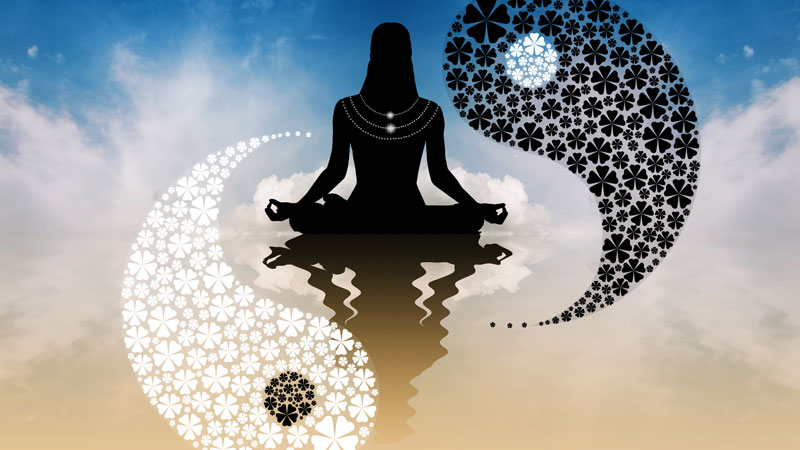Essential oils for balancing Qi (energy)

In my latest article I will explore how aromatherapy essential oils can be beneficial in helping to restore energy within the body when applying Traditional Chinese Medicine (TCM) principles.
Chinese medicine is based on the principle that energy (or Qi) flows through channels in the body known as meridians, and that disharmony will result if energy cannot flow freely. There are fourteen meridians, each related to and affecting a major organ of the body. Yin meridians are located on the anterior (front) of the body and the energy flows upwards, whilst Yang meridians are located on the posterior of the body and energy flows downwards. Yin, considered to be feminine, is dark, moist, soft and receptive and associated with the earth and moon, autumn and winter, and the night, whilst Yang, considered to be masculine, is light, dry, hot, hard and active and associated with the sun, spring and summer, and the day (1). Yin and Yang are everywhere, however, nobody is ever completely Yin or completely Yang – the balance of both is continually fluctuating. A balance of both Yin and Yang energies is believed to be important in maintaining good health and well-being by those practising traditional Chinese medicine (1).
Aromatherapy essential oils can be considered either Yin or Yang by their rate of evaporation (an essential oil, dependent upon its rate of evaporation, will be either a top, middle or base note). Middle note essential oils such as Lavender (Lavandula angustifolia) and Geranium (Pelargonium graveolens) are considered particularly useful for balancing Yin and Yang (1). Warm and invigorating oils such as Basil (Ocimum basilicum), reputed to be excellent for exhaustion and nervous depression, are said to tonify Yang. Cardamon (Elettaria cardamomum), a warming oil, excellent for damp, catarrhal conditions (2), is a Qi tonic. German Chamomile (Matricaria recutita), helping to relax the nervous and digestive systems and reducing spasms in the muscular system, encourages the flow of Qi, and this is also said to be true of Roman Chamomile (Anthemis nobilis), one of my personal favourites! The ancient Chinese also believed that Vetivert essential oil (Vetiveria zizanioides) helped to cool the system. They recommended it for Yin deficiency as well as a meditation aid for soothing the mind (3).
Using essential oils to balance Qi energy
Aromatherapy essential oils may be used in several ways to help balance Qi energy. The most popular methods are shown below:-
- Aromatherapy Baths – this is a particularly lovely way to use the essential oils. If you feel that your Qi is depleted, mix five drops of Clary Sage (Salvia sclarea) with 5ml of Sunflower oil and add to the bath. This is said to aid relaxation, release nervous tension, relieve insomnia and improve circulation of Qi.
- Warm compresses - these can be used for a variety of conditions such as aches and pains and bruising. Clove Bud essential oil (Eugenia caryophyllata) can be used to generate warmth and is reputed to tonify Qi. For a warm compress use 5 or 6 drops of Clove Bud oil in hot water, lay a clean cloth on the surface of the water to soak up the oil, wring out and apply to the affected area - repeat the process when the compress cools. Please note that Clove Bud is generally regarded as a skin irritant and sensitizer. Spot test first and do not use if you have sensitive skin.
- Aromatherapy Massage - this is my most favourite method of using essential oils! What can be more indulgent than having a relaxing massage with your favourite aromatherapy oils! Use a ratio of 1 drop of Rose (Rosa damascena) essential oil in every 2ml of carrier oil to help clear heat, inflammation, alleviate anxiety and depression, and restore the energy balance within the body.
Applying the principles of Traditional Chinese Medicine (TCM) to Aromatherapy certainly provides therapists with the opportunity to develop a different perspective on choosing essential oils prescriptively for the discerning client, and offers them, I believe, a unique selling point for their business. Why not give it a try!
You can purchase all of the above mentioned aromatherapy oils from our website, and don't forget we offer up to 15% discount for registered therapists.
Christine Fisk
Consultant Aromatherapist
Read other articles by Christine Fisk
References:
- Yin and Yang in Aromatherapy, http://www.your-aromatherapy-guide.com/yin-and-yang.html, accessed 31 March 2017.
- Battaglia, S. (2003) The Complete Guide to Aromatherapy 2nd Edition. Australia: International Centre of Holistic Aromatherapy.
- Vetiver Essential Oil, http://ayurvedicoils.com/tag/oils-for-yin-deficiency, accessed 31 March 2017.




